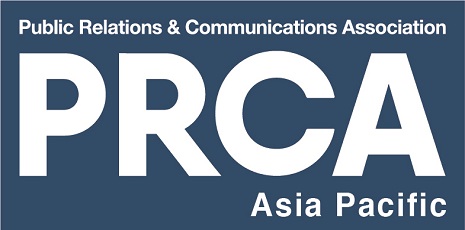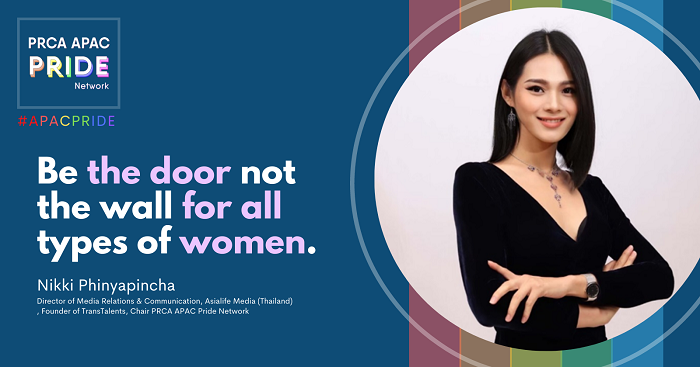According to a survey by UNDP, ILP in 2018, 90% APAC LGBT+ said that the workplace has not put LGBT+ inclusive policies in place (LGBTI People and Employment: Discrimination Based on Sexual Orientation, Gender Identity and Expression, and Sex Characteristics in China, the Philippines and Thailand).
On 28th February, PRCA APAC launched PRCA APAC Pride Network. The Network is the APAC business community for LGBT+ & Allies PR professionals to connect, collaborate and communicate the power of Diversity, Equality & Inclusion in PR Industry.
Today on International Women’s Day, there is a hot critical debate about whether or not a Transwoman is a woman.
We were fortunate to speak to Niki Phinyapincha about this topic. Niki is the Director of Media Relations & Communication at Asialife Media (Thailand) and founder of TransTalents, an online blog that advocates Thai transgender professionals to break the discriminated steryotype, to thrive professionally in business world and to empower them to be a future leader.
1. Do you think that a transwoman is a woman?
Transwoman is a woman. They identify themselves as a female that opposite to the male sex assigned at birth. They live their lives as women. If you validate a woman just because of a biological lens such genital/reproductive system/period, then do we still validate a woman who cut their womb, due to medical reasons, as a woman? what about intersex and other types of women? I think we should change the question from whether a trans woman is a woman to how we can support and empower all diverse types of women to be who and what they want, especially in the workplace where nowadays the gender discrimination still remains in many organizations.
2. What are the bias and barriers towards transwoman to break, especially in the workplace?
Current conversations on careers and gender equality in the workplace are focused on differences between “women” and “men rather than LGB especially trans. For example, 77% of transwomen in Thailand were rejected their job application because of their gender identity followed by Lesbian 62.5% and Gay 49%. Not all LGBTI Thais suffer equally. Trans remains among the most suffering ones. We also see the focus on equal employment and pay for women, pushing women in management level while transwomen are not really in the agenda. It is a time to start putting authentic gender diversity concept into a company agenda and turn it into concrete policy not only in HR corporate function but in overall strategy.
3. What are the concrete approaches that would bring the brighter future for trans women’s leadership in the workplace?
The voices from those most affected by inequality and biases are often underrepresented at the decision-making table. Transwoman needs a seat at that table, we need an opportunity and invitation to be seated there to help reshape the people’s strategy, recommend proper guidelines and implementation. That’s how the workplace can be a better place as we need trans participation, contribution in leadership roles to redefine the company’s purpose on gender diversity workforce. The trans-inclusive policy should not be an option anymore for the workforce transformation. In addition, I also have learnt from IBM from our latest Trans Leadership and Sustainability virtual seminar that they has a long history of LGBT support ecosystem especially initiating trans career journey program that engage trans community to support and achieve the end game sustainable workforce.
4. What are the most important things you want to tell all types of women?
One thing all types of women must do is being a leader of your own life. Nothing is more important than having and leading your own life. We must believe in ourselves and the power of unique individuality and togetherness to earn our spaces in any where we are, especially in leadership roles. Second, remember also to be a door not a wall for each other as it costs nothing to be kind and nice. It doesn’t devalue your own identity or rights in any way. Stand up for each other and stay proud and loud more than ever!
If you’d like to share your own pride story or to nominate any other role model pride story, please share to us at [email protected].
About Nikki
Nikki Phinyapincha was born in Bangkok, Thailand.
Promoted as a Director of Media Relations and Communication in an international PR firm before turning 30, a professional transwoman Nikki Phinyapincha is a communication business strategist as well as a spokesperson (VITO) for the Ministry of Tourism & Creative Economy, Republic of Indonesia for Thailand & Indochina market. With a background in corporate and branding communication and leadership, her career expands over several industries including tourism and hospitality, luxury and lifestyle and international trade. Nikki worked her way up from an entry-level position to earn her seat at the C-Suite table. Nikki is also a Chair of PRCA APAC Pride Network, Country Director of AYAN Thailand and Diverse, Equality, and Inclusion (DE&I) keynote speaker advocating trans leadership and gender diverse workplace for various organizations including IBM, Hill+Knowlton Strategies TH and Karlshochschule Academy in Germany. Nikki recently founded TransTalents, a personal blog with a determined purpose to help and empower transgenders to thrive professionally and be a future leader in corporate companies no matter what barriers and limitations they face. Nothing is impossible.


